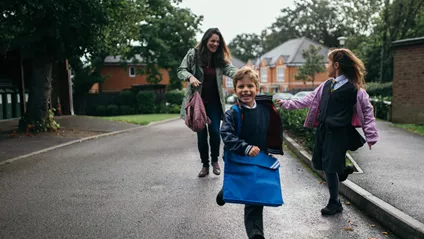Coping with transitions in foster care
Transitions and change are a big part of life for children in care, and starting at a new school— whether that’s due to moving locations to be with a foster family or transitioning from primary to secondary school— can be a scary and complex time.
Stress and fear around starting at a new school can pop in in many ways, from challenges with behaviour in the classroom to feelings of anxiety or even illness— a person really can feel sick with worry! Let’s take a look at some ways to help your foster child adapt to a new school to make this big change a little easier and more enjoyable.

3 tips for starting your foster child at a new school
-
Prepare well in advance for a great first day by…
- Trialling the school route. In the run up to your foster child’s first day at a new school, be sure to do a trial run of their route, particularly if they’re older and will be walking, cycling or taking the bus to school alone or with friends.
- Trying on uniforms. It can also be helpful to have your young person try on their whole school uniform and P.E. kit to ensure that everything not only fits well, but they’re comfortable with the way it looks and feels (a factor which is especially important if your foster child has sensory issues). Don’t forget to teach them to tie their school tie and shoes too, if needed!
- Good sleep and nutrition. A a good night’s rest and some good, wholesome food will give your young person the right fuel to face their first day at a new school. A healthy breakfast in the morning, like wholegrain toast with peanut butter, will compliment a hearty meal the night before and make all the difference to their learning and energy levels. Tuna or salmon pasta for dinner is a great choice, as it’s packed with plenty of carbs and healthy brain-boosting fats from the fish.
-
Get to know the school by…
- Visiting the new school. If your foster child is transitioning from primary to secondary school, their school will likely have a trial day where the soon-to-be Year 7 classes visit their new school and meet some of their teachers. Planning a visit to the school in advance can really help them to feel more comfortable and confident.
- Meet the teachers. Part of your role as a foster parent is being an advocate for your foster child, and you’ll be best equipped to do this by developing relationships with the important people in their life, including their new teachers. Meeting with teachers and other important figures like the school’s SENCO gives you the opportunity to ensure they understand your foster child’s needs.
- Access support designed for children in care. There’s plenty of support available for looked after children in schools. Be sure to discuss options at length with your child’s new school, as well as seeking the guidance of your foster child’s social worker and your supervising social worker to ensure you aren’t missing out on anything valuable, such as reasonable adjustments at school. You can also seek the support of our education experts here at Fostering People, as well as enjoying the benefits our holistic range of support for looked after children.
-
Support your foster child’s confidence by…
- Use open communication. Starting at a new school can be a stressful time for children in care, who may deal with anxiety around being separated from their caregivers, as well as having to navigate school through the lens of trauma. It is also common for looked after children to feel that they are behind their peers, which can contribute to school feeling overwhelming. Regularly check in by talking with your young person about how they’re feeling so that you can support them.
- Support them in making new friends. Making new friends is one of the most daunting parts about starting at a new school. Supporting you foster child to sign up for some lunchtime and after school extra-curricular activities can give them lots of opportunities to meet new people who share their interests. You can help to nurture their new friendships by arranging meet-ups and fun days out with their friend’s caregivers.
- Supporting their independence. Children who are transitioning to secondary school will be handed a lot more expectations and responsibility as their teachers begin to prepare them for a career and life in the adult world. You can help to foster their independence by ensuring they have privacy and quiet to complete their homework, and by developing a simple school routine with them which they’re able to follow independently.
First week at school checklist for foster parents
Having the chance to pick out a new stationary set, lunchbox or school bag can add an element of excitement for children during a time filled with big changes. Here are some essentials and useful items to gather with your young person to help prepare them for their first few days at a new school:
- A good-sized school bag
- Pencil case & stationery
- Lunch money or a packed lunch
- Travel money or bus pass, as required
- P.E. kit
Top Tips…
- Keep a can of deodorant and a carrier bag in your foster child’s P.E. bag. This way they’ll be able to freshen up, as well as having something to store dirty trainers or muddy kit in!
- As well as school planner and lots of different exercise books, your foster child will likely be given a weekly timetable and a map of the school during their first week. Remind them to keep these somewhere safe— they’ll come in super handy throughout the year!
Are you looking to foster in the UK?
If you’re ready to become a foster parent, we’re ready to welcome you and your family. Contact our team today to find out if you’re the right candidate to foster, and what we here at Fostering People can offer to support you on your fostering journey.





